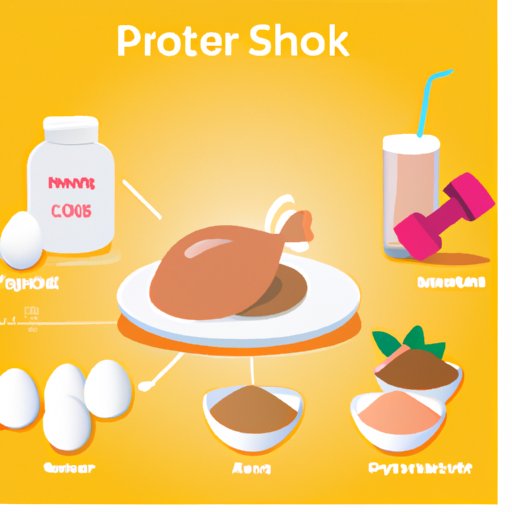Introduction
Protein is an essential macronutrient that plays an important role in our bodies. Protein helps build muscle, strengthens bones, and boosts metabolism. But how much protein can we absorb in one meal? This article will explore the limits of protein absorption and provide tips on how to maximize your protein intake at each meal.
Exploring the Limits of Protein Absorption: How Much Can You Consume in One Meal?
The amount of protein you can absorb in one sitting depends on several factors. These include your age, gender, activity level, and weight. Additionally, the type of protein you consume also affects your body’s ability to absorb it. Animal proteins, such as eggs, dairy, and meat, are usually more easily digested and absorbed than plant proteins, such as beans and nuts.
Generally speaking, the optimal amount of protein for maximum absorption is between 20-40 grams per meal. Eating too little protein can lead to inadequate nutrition, while eating too much protein can cause digestive issues and other health problems.

How to Maximize Your Protein Intake at Each Meal
Eating for maximum protein absorption requires planning and preparation. Here are some tips for getting the most out of your protein-rich meals:
- Choose lean protein sources, such as fish, tofu, and skinless chicken breasts.
- Incorporate healthy fats, such as olive oil and avocado, into your meals to help your body absorb the protein.
- Eat small, frequent meals throughout the day to ensure your body is absorbing enough protein.
- Drink plenty of water to help your body digest and absorb the protein.
These strategies can help ensure you get adequate amounts of protein while avoiding potential digestive issues.
Protein Overload: What Happens When You Eat Too Much?
Consuming too much protein can lead to a range of unpleasant symptoms, including bloating, gas, and constipation. Eating large amounts of protein can also put extra strain on your kidneys and liver, which can be dangerous if done over long periods of time.
To avoid consuming too much protein, it’s important to pay attention to your body’s signals. If you experience any of the symptoms associated with protein overload, reduce your protein intake or spread it out over multiple meals.
A Guide to Protein Consumption: How Much Is Too Much?
The recommended daily intake of protein varies depending on your age, gender, and activity level. The average adult should consume 0.8 grams of protein per kilogram of bodyweight per day. For example, a person who weighs 70 kilograms should aim to eat 56 grams of protein per day.
Eating more protein than recommended may have some benefits, such as increased satiety and improved muscle growth. However, it can also lead to negative side effects, such as dehydration and kidney stones. Therefore, it’s important to assess your individual needs and consult with your doctor before making any changes to your diet.
The Science Behind Protein Digestion: How Much Can You Absorb in One Sitting?
Protein digestion begins in the stomach, where enzymes break down the molecule into smaller pieces. From there, the partially digested protein passes through the small intestine, where additional enzymes further break it down into amino acids. These amino acids are then absorbed into the bloodstream and used to build muscle and other tissues.
Studies have shown that the body can absorb up to 40 grams of protein in one sitting. Anything beyond that is likely to be excreted as waste.
Eating for Maximum Protein Absorption: What You Need to Know
Certain foods can contribute to maximum protein absorption. These include high-quality protein sources, such as eggs, dairy, and lean meats. Additionally, consuming foods rich in healthy fats, such as olive oil and avocados, can help the body absorb protein more efficiently.
Timing is also important when it comes to protein absorption. Eating a protein-rich meal shortly after exercise can help the body utilize the protein more effectively. Additionally, eating protein-rich meals throughout the day can ensure your body is getting enough of this essential nutrient.
Conclusion
In conclusion, the amount of protein you can absorb in one meal depends on several factors, including your age, gender, activity level, and weight. Generally speaking, the optimal amount of protein for maximum absorption is between 20-40 grams per meal. To maximize your protein intake, choose lean protein sources and incorporate healthy fats into your meals. Additionally, pay attention to your body’s signals and avoid consuming too much protein. Finally, timing is key; eating a protein-rich meal shortly after exercise can help the body utilize the protein more effectively.
(Note: Is this article not meeting your expectations? Do you have knowledge or insights to share? Unlock new opportunities and expand your reach by joining our authors team. Click Registration to join us and share your expertise with our readers.)
